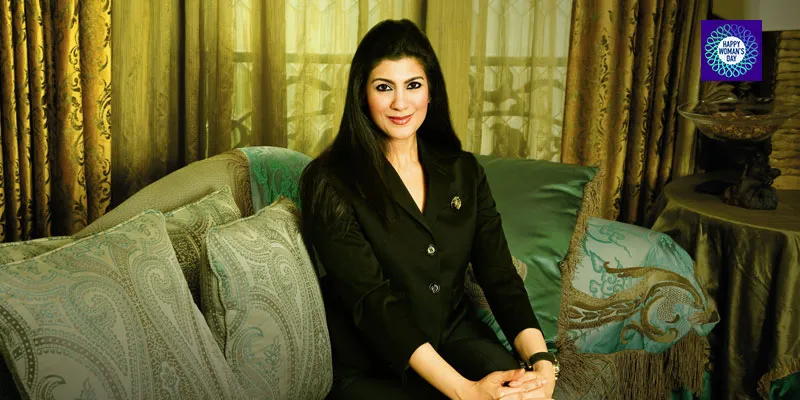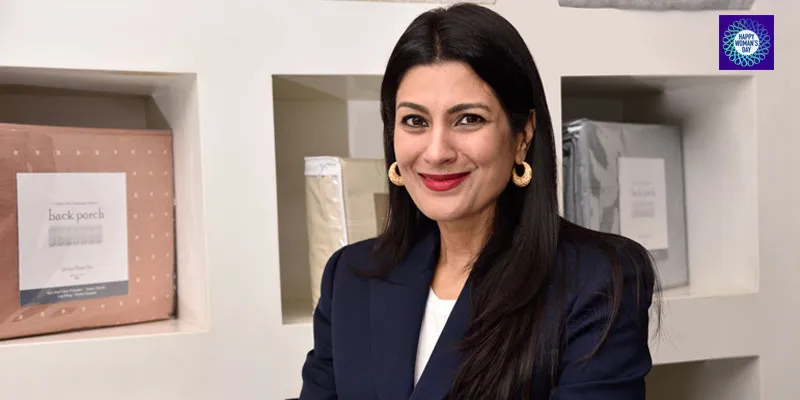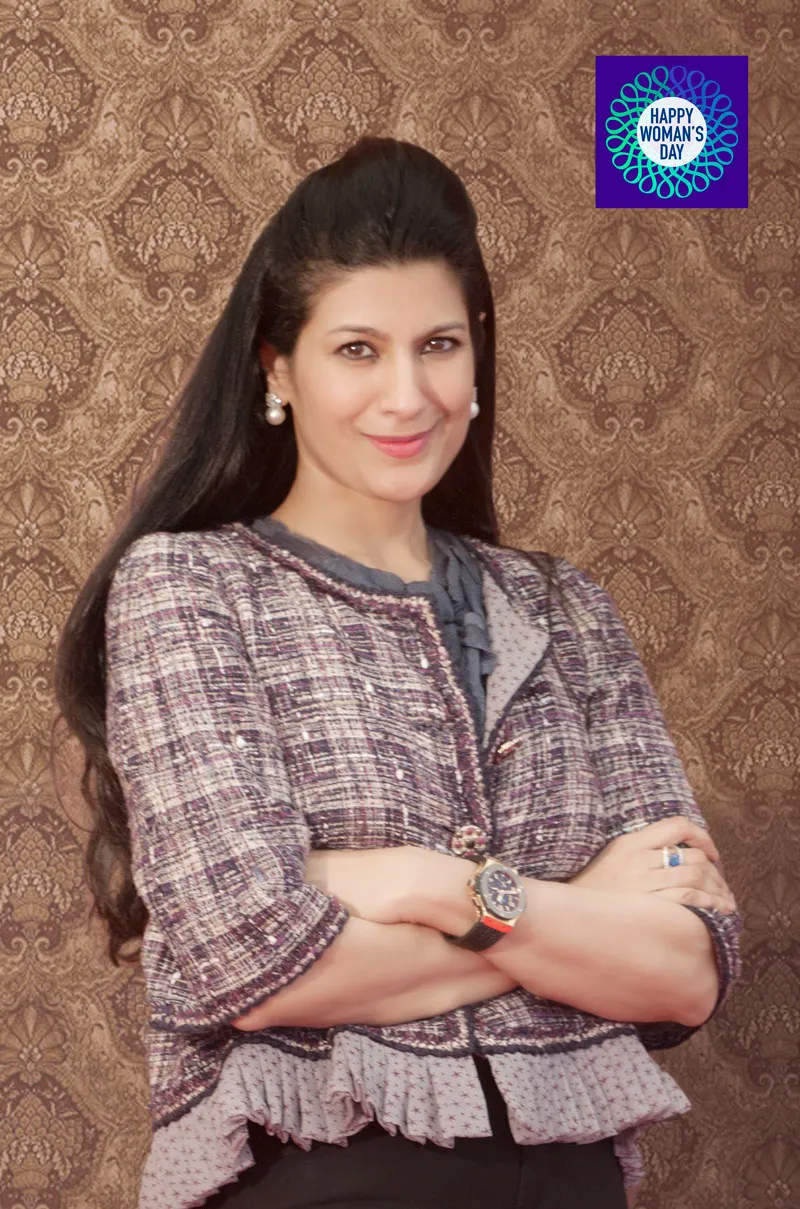Towels at Wimbledon, Australian Open, and every fifth one sold in US bear her stamp — meet Welspun's Dipali Goenka
Dipali Goenka is every woman.
When she sits across from a journalist, that incandescent smile isn't the cavalier one of a CEO of one of the world's top three home textile corporations; it is of a person like you — a woman — who has braved insurmountable odds, and is itching to tell you her story.
Back at her manufacturing units in Gujarat's hinterlands, when she excitedly speaks in unpretentious English to the girls who overcome daily tribulations to work for her, she's a concerned elder sister, and wants to tell you that they are the most indispensable part of her climb, and must accompany her to the top.
At office, she's not the super boss who orders you to sell and sell till the targets blur in the background; she's the colleague who shares your desk and your apprehensions, who sells with you, and shows you how to market a towel like a jewel.
At home, the whole world and its demands slowly disintegrate, until the scene is just her and her daughters, whom she is teaching every day to be fiercely independent so that they have a more propitious start than she once had.
And in the boardroom, she proves, time and again, that she is the best decision they ever made, as turnovers from Welspun's textiles arm double under her tutelage.

Early memories
Chief executive and Joint MD of Welspun India Ltd., Dipali Goenka's internal journey of gaining an enlightened, gender-neutral worldview began as early as 47 years ago, as soon as she opened her eyes to the world. She was born in the Pink City under the wings of a mother who cared for an ailing husband, tended to household chores, and ran a business, while at the same time raising Dipali and her siblings, with awe-inspiring acceptance of the hand she was dealt. “My mum's life wasn't easy. She's a woman of strength, and she's my earliest influence,” she says.
And yet, the paradoxical experiences that followed put her empowered sensibilities to extraordinary tests.
The detour
Halfway through college, Dipali’s father's health was deteriorating, and hence, the verdict from her familial ecosystem and society alike was the guillotine for her life as she knew it. It was decided that she would have an early-ish marriage and “settle down”. “You've seen this happen in films, and well, it happens in reality too!” she sighs.
A long running joke in the family was that Dipali was so unprepared for life that she didn't know how to build a fire if handed a match. How was she to build a life, then? “Suddenly, I was all alone in Maximum City. I had children early, and I had to create a support system from scratch – but, I believe, that made me stronger,” she recalls.
Her daughters, Radhika and Vanshika, were her everything – she focused all her energies on being an exceptionally proactive homemaker, and an equally involved mother. She derived immense happiness playing these roles for the first ten years of her motherhood, until her girls had grown old enough not to need constant supervision.
With increasing time on hand, and hence restlessness, she found that the other pursuits of homemakers, parties and catch-ups over cups of tea, weren't her cups of tea. “With some nudging from friends, I once went to a kitty party. When I told my mother that, she blew her lid. She said, ‘If you have this much time on your hands, do something worthwhile with it,’” she recounts.
Without much ado
The hunger to learn and evolve started gnawing at her, and as circumstances became more conducive, a new life beckoned. Dipali decided to seize the opportunity with the simple act of showing up at work one day, at Welspun. “You would have met a lot of professionals; I'm not a professional. I was a homemaker. The rock bottom was liberating, because you can gauge your endurance and capabilities. So, I came to work, first, slightly involved with the construction of the new office space, then slowly, the administration, then sales, and before I knew it, I was in business!”
They had started out as Welspun Winilon Mills in Palghar district in 1985 with a small texturising unit. Welspun Corp Ltd. (WCL), the flagship company of Welspun Group incorporated in 1995, now became a global giant in the large diameter line pipe segment. And it was in 2003 that Welspun made their most profitable addition – Dipali.
It was a while until her husband, B.K. Goenka (who co-founded the Welspun Group along with his cousin Rajesh R. Mandawewala) realised that Dipali had arrived not to concur, but to conquer. “You know how most women do this as a hobby. But ever since I first entered, I was never his wife. I was me, and I was there to become a professional,” she narrates.
Her entry came at a time when the economy was opening up, and Welspun had decided to shift focus inwards. So, rather than just exporting to Europe, America and the Middle East, they set up a retail arm here, in their homeland. Consequently, 2003 was when Dipali's third baby, 'Spaces - Home and Beyond', was born. “Now this was difficult. The girls were growing up at the time. By 7:20 am, they had to be ready for school. So, I'd wake up, send them off, get to work myself by nine, and return by six. All this while I was still me - no MBA or professional background, and merely the wife of a textile guy, then. I learnt to deal with the distributors on the job,” she says.

Creating her own “Spaces”
Dipali got a taste of success early on, as Spaces took off and gained the position of a market leader, a position it still holds today. “I set up my stores myself, and shipped products from the warehouse myself. You don’t get success unless you truly involve yourself in every rung of the business. You have to get your hands dirty. I've even sold my products at the stores,” she says.
Not one to blink while looking golden opportunity in the eye, she started WelHome, a line of bed and bath linens. After this dream run, the setback encountered when they had to shut down some Welhome stores felt even more crushing. “I felt real pain. We had to do it, as real estate and manpower was challenging, but we were the largest home stores in the country, and there were more goals to achieve. People ask me how I did it, and I say, running away is no fun,” she narrates candidly.
In 2008, when recession struck the US, they had set up their sheeting unit, and underwent their own turmoil. They were also directly competing in bedding with Mexico, when NAFTA came into effect. It was amid such testing circumstances that the founders, that is the Goenka brothers, BK and Rajesh, asked Dipali if she could assume the reins and overhaul the vertical – an indisputable testament to their faith in her capabilities.
“I told them, ‘What are you saying? I'm running retail, and I'm not ready yet.’ But they assured me that I was,” she recalls.
Hitting the ground running
It was in this backdrop that Dipali entered the world of textiles, taking charge of Welspun India in 2010. “You're jolted. Women are only on the other side, buying. Behind the scenes, it's a complete man's world. In a meeting of 15 people, you're the only woman. You're talking business and technology, while people are very evidently wondering, 'Does Welspun know what they are doing? Maybe they only care about pipes, and not textiles,'” she recounts, from some of her earliest, most harrowing experiences.
And after the SEBI guidelines mandating one woman on the board of every listed company, people directly questioned her claim to the chair. A journalist once even tactlessly asked her, “You're just another corporate wife. Do you actually do something, or are you just checking a box?” “Biases surface at all levels – at factories and at board meetings. In India, you cannot look good and be taken seriously at the same time,” she elaborates, adding, “but I don't indulge this negativity. Otherwise, I'd have gotten sucked into these petty wars, and it would have affected my work. I focused on my KRAs instead. I'm answerable only to my company and customers, and I get pulled up when needed, just like the others. I worked to receive validation from them, no one else, and I let my work do the talking,” says the boss.
And that work talked – nay, roared. Welspun India's revenue and earnings went up several fold, with a net profit of approximately $110 million on revenues of $950 million in FY16.
As CEO and Joint MD at Welspun Group, she was also in the eye of a storm six months ago, in August 2016, when questions were raised by their retail partners about the traceability of the Egyptian cotton they claimed to use in their products. “It made us realise how vulnerable we can be. We are setting up systems, and ensuring traceability. And as you grow big, systems are the only thing to take you forward – they are integral at organisations as large as ours,” she states. As of one month ago, they have entered into an agreement with the Cotton Egypt Association to carry their logo as a sign of veracity.
Two worlds, one solution
On the list of her core responsibilities, and something she insisted on putting there, was being in touch with the manufacturing side of things. These visits made Dipali feel like she was leading dual lives. “Socialising was glitzy, but working in the factories was grounding. At the factory, people would ask me, ‘Are you a designer...what do you do at Welspun?’ I would tell them that I ran the company, and invite utter disbelief. Even then – as urbaners, our lives are simple – I can say and get what I want in my air conditioned cabin, but the women in my factory wake up at five am, make dabbas, commute four hours one way to work hard and scrape up a living, and go back to cook again. These are what real struggles look like,” she says.
Welspun has large manufacturing units in Anjar and Vapi, where Dipali worked hard to employ at least 14 percent women labourers. The women in the office workforce across locations also constituted a meagre 5-6 percent, which she brought up to 16 percent, with a vision to cross 20 percent by 2020. “I have raised two daughters in a Marwari household, where a boy is preferred, to live out each of their dreams. While I'm aware enough to talk and think this way, what about the woman deep into the country, where the real India works? If you can empower her, it'll change India,” she explains.
They started a girls’ hostel for those who work in their facilities, and its patrons are also allowed to earn a living outside of that. She goes down there every Friday, and makes it a point to spend time with the girls. “We got these girls from Jharkhand, barely 19-20 years old, and anaemic. Some time ago, we used to charge ten rupees for breakfast, which they would skip because they could not afford it. I immediately waived those charges,” she recalls, adding, “They're my young girls, and they have come down here with many aspirations.”
Welspun is making sure that they take online training and graduate. Dipali fondly tells me how she only speaks to them in English. “My dream is to see a factory run by women. They're stable and bring more balance into the workplace. Don't you think this world will be a different place if more women went to work?” she muses.

Riches with respect
Welspun decided to deepen this bond with the local communities through education, empowerment and healthcare – through their three Swasthi Swarnim Centres for vocational training for women, health camps in areas surrounding the factories, and their Welspun Vidya Mandir (a school up to Standard X) at Salav, Maharashtra, and Anjar, Gujarat, which will provide quality education to over 2,060 students. They are also working with 40 other schools for teacher training.
In fact, Dipali has also crafted a brand called Spun, under which eight centres have been established in Gujarat, where over 800 women are being taught hand-weaving and stitching to produce retail-ready products like rugs, beddings and cushions. One woman now readies herself to go from Anjar to Arkansas. “The craft from these Kutch communities was dying, so the idea was to make it versatile and adaptable to the global language. Now, giants like Bed Bath & Beyond, Tesco, and hosts of other retailers sell these products,” she explains.
The Forbes-acclaimed 16th most powerful woman in business in Asia has also helped set up FICCI Flo's Young Flo in Mumbai. “I learnt that women are communities - and if we get together, we are stronger,” she says. In a society where little has changed since Dipali first got married, the pressure on her daughters, both career women, to get married is still immense. “The same society also tells me, ‘You're too busy working, you're not focusing on your kids, they will not get suitors from good families.’ My husband is really supportive, too – I'm out ten days a month. When he has to go out in social situations, he handles questions about my absence and our daughters' marriage with utter class. And when I'm there, I step in and say, ‘Nothing doing. They will find themselves first, and find suitors later!’”







